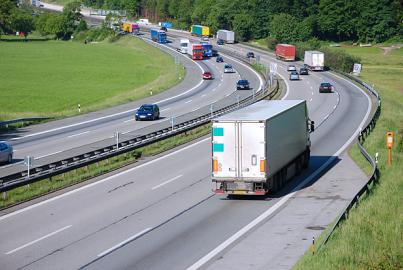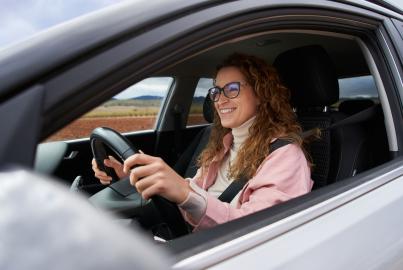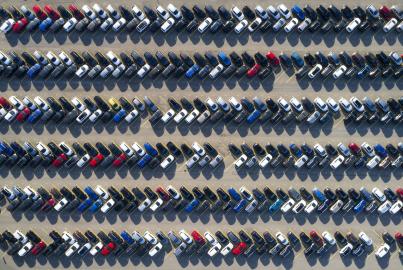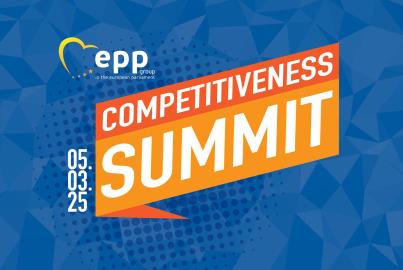EPP Group Position Paper on Mobility and Transport until 2030 and beyond
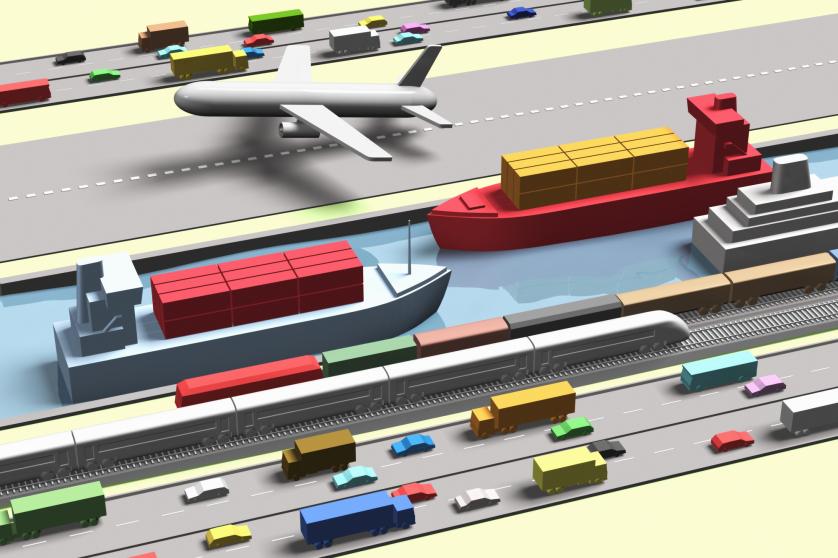
Freedom of movement and a well-functioning European transport sector is the cornerstone of growth and employment in the EU, especially during the current COVID-19 pandemic and the future European recovery.
We call for the application of one simple rule during similar crises: open borders for the transport of goods.
The EPP Group is convinced that mobility is a right for all citizens. Neither the current COVID-19 pandemic nor the necessary fight against climate change can be allowed to lastingly undermine the mobility of people and goods on our continent. Only by setting up a stronger, more resilient and sustainable transport network, will Europe be able to overcome future crises and master challenges.
Effective solutions are needed to manage the pressure put on the transport network and the environment without generating heavy costs and administrative burden for users. Transport must be fit to cope with new environmental, socio-economic, technological developments as well as public health, requiring significant investments in new mobility models, digitalisation, research and innovation, alternative energy sources and energy efficiency.
Transport must contribute to reaching the EU emissions reduction targets in a technologically neutral way, while making sure that transport remains affordable. It can hugely benefit from research and the Union’s research policy has to be geared towards strengthening the sector’s competitiveness, environmental performance and maximising its benefits. The transport sector is one of the largest employers and since it is undergoing major changes, we must make sure that these changes have positive effects on jobs. All future measures must be science-based and follow comprehensive impact assessments that take into account economic, environmental and social consequences. The environmental performance of transport products and projects should be determined by measuring life-cycle emissions.
Transport must provide the best conditions for passengers. The EPP Group is calling for a fair system of passenger rights in all modes of transport. The European Commission should provide a legislative framework for multimodal, “door to door” ticketing, booking and payment services.
The fragmentation of the transport market cannot be overcome without the proper alignment of national infrastructure decisions with EU policy priorities and the implementation of existing European rules. European harmonisation and standardisation, together with market opening, are mandatory and urgent measures for an effective EU transport sector.
The key challenge for the functioning of the transport market is to create conditions for fair competition and adequate social and environmental legislation. Our strategy should take into account the differences between Member States. We must propose solutions that reduce the backlog of transport projects and do not result in further disparities between the developed and less developed regions of the Union. We in the EPP Group believe that there is no one-size-fits-all solution, but that there are different solutions to deal with different situations.
Climate change is a global challenge and it needs a global solution. Therefore, the EU needs to support efficient and viable international initiatives in all areas including transport, especially in the aviation and maritime sectors.
The EPP Group welcomes and values that aviation has opened up the world for our citizens. This was possible through the democratisation of air travel that the liberalisation of the market brought about.
Yet with rising traffic becoming the norm, aviation needs to advance the deployment and ensure ambition in the international carbon offsetting scheme, known as CORSIA. To achieve this, the Union must speak with one voice in the International Civil Aviation Organisation (ICAO).
Alternative aviation fuels need to increase market share in order to contribute to emissions reduction. The EPP Group is for the thorough assessment of the life-cycle emission of these fuels.
Further emissions reduction may be achieved with the adoption and implementation of the legislation on the Single European Sky 2+. The EU already supports research in aviation (Clean Sky Joint Undertaking) and this should continue and intensify to provide technological solutions including for alternative fuels. Solutions stemming from such research, like the use of satellites and the complete deployment of the Single European Sky Air Traffic Management Research (SESAR) should be completed as soon as possible throughout the EU.
A revision of state aid rules for airports is also necessary in order to significantly decrease emissions and travel time, while increasing efficiency. We call on the Commission to incentivise aircraft manufacturers to adapt future production to European short distance, single-leg flights suitable for electric solutions. Airports should be systematically connected to cities through (high-speed) train lines. Airports must use only zero-emissions vehicles.
The pandemic has created a real crisis for both airlines and plane manufacturers. We are asking for an EU-level coordination of travel restrictions, hygiene and health protocols. The Recovery and Resilience Facility should include a Project of European Added Value for the aeronautics industry’s recovery to facilitate the replacement of fleets with new and more sustainable products.
Our Group believes that we must weed out inefficiencies in the EU road transport sector and the best way to do this is through the full completion of the Core Trans-European Network (TEN-T). Therefore, the EU should only approve and encourage financing and innovative blending solutions for infrastructure projects that are on this network.
Legislative predictability is important for both manufacturers and consumers when we speak about road vehicles. The EU must continue to invest in R&D dedicated to alternative fuels solutions. We ask for appropriate financing for the Hydrogen Fuel Cell-Joint Undertaking. The EPP Group calls for a roadmap for the reduction of emissions of the automotive industry and the vehicles it produces based on a comprehensive study taking into account all economic, social and technological capabilities, costs, market affordability and infrastructure adaptability. This roadmap should also include a dedicated European programme for recycling vehicles.
We endorse the idea of European support for the development of a competitive zero-emissions family car.
New motorways have to be built in a future-proof way, namely with a digital network structure and sufficient electric charging points, hydrogen fuelling stations, secured freight parking areas and enough sanitary units. The adaptation of infrastructure to new mobility patterns and types of vehicles should be a priority. The EU should pursue decarbonisation in a technologically neutral way, automation and electrification of road transport, including freight transport. The EPP Group calls for an EU roadmap for road infrastructure aligned with the automotive industry roadmap.
Safety must always be our utmost objective when designing infrastructure requirements. No-one should die on European roads in traffic accidents. Road users already pay significant amounts to use infrastructure, either directly through tolls and vignettes or indirectly through vehicle, road and environmental taxes and excise duties on fuel. These vast sums should be reinvested in their entirety in the upkeep, modernisation and improvement of our road infrastructure.
Sustainable road transport cannot be reached without a modern rail network and an efficient inland waterway network. To shift to rail or to water we need a well-functioning rail network and waterways along with Motorways of the Sea.
The EPP Group considers that our Inland Waterways must be used for significantly higher volumes of traffic, by putting freight from the road onto waterborne transport with a holistic approach to increase utilisation and efficiency.
The European Commission should come forward with proposals to regulate this entire mode of transport and promote its usage as soon as possible, as it is one of the most environmentally-friendly means of transport. The proposals should provide for European harmonisation and standardisation for both navigability and equipment.
The navigability of European inland waterways is patchy and, in order to bring about significant improvements, dedicated financing needs to be set up in several funding instruments, such as the Connecting Europe Facility, the Cohesion Funds, the Recovery and Resilience Facility (RRF) or with the participation of the European Investment Bank. Incentives should be provided for the development of intermodal ports platforms. We call for a Project of European Added Value, financed by the RRF, for the navigability and multimodal connection of TEN-T inland waterways corridors. Inland Waterways are suitable for the deployment of hydrogen, LNG, sustainable fuels, hybrid and electric vessels and automation as well, if the EU directs research and funding this way.
If the EU is to successfully reduce its emissions from transport, a real shift of a significant part of freight from road to rail needs to become reality. Rail should be forced into becoming competitive with road transport on freight. Regions in the periphery of Europe lack high-quality railway links with the rest of the EU, whereas creating a fast and modern railway network across the whole EU is a priority. We believe the Commission must urgently address the lack of interoperability and the incomplete deployment of the European Railway Traffic Management System (ERTMS) as this flagship technology can radically improve the capacity and safety of the European rail network. The EPP Group calls for a road-map of ERTMS implementation on Rail Freight Corridors including a Project of European Added Value financed by the RRF.
We must closely monitor if the desired simplification and interoperability brought by the 4th Railway Package are correctly implemented and timely achieved and we ask the Commission to propose the appropriate corrections. Rail transport is plagued by a myriad of standards, differing procedures and incompatible technology and as such, the EPP Group calls for an urgent EU harmonisation and standardisation of the sector including a Single Rail Signalling System.
To further increase competition without lowering standards, we require more flexible rules to access the infrastructure and open the railway market. Investment in this mode of transport should aim at achieving the doubling of the average speed of rail traffic by 2030. Particular focus of investments should be on regional, cross-border connections and logistics hubs, such as port and airport areas. Our citizens and companies deserve better value and passenger protection for their money and rail transport should be as attractive, affordable and high quality as possible, especially since the sector is partly funded by the taxpayer.
The EPP Group is asking the Commission to evaluate the establishment of a European Management of the Railway Traffic that could bring a major contribution to the effectiveness and attractiveness of rail transport.
The EPP Group calls on the Commission to come up with a realistic long-term planning for a high-speed railway network in the EU.
While urban mobility is economically, socially and environmentally very important, it is also becoming highly difficult and often restrictive due to the patchwork of congestion charge and low-emission zones, each with their particular access rules and access enforcement. Common European standards and technological solutions will allow for seamless access to all such zones. We also believe in a future sustainable public transport and we call for a European Urban Transport Strategy.
Maritime transport, by its scale and nature is international and an environmentally friendlier way of transporting goods and passengers with yet a lot of untapped potential in it. Vessels can easily be adapted to use cleaner fuels instead of heavy oil, while hybridisation and electrification is becoming more viable and the EU has already financed substantial research in this respect. There are already electric ferries operating commercially, with 75% lower operating costs, all thanks to Horizon 2020 funding.
The EU should exploit this possibility to the fullest and accelerate the adoption of electric vessels for short routes, and further digitalise maritime operations. European ports should be equipped with electric charging and grid points to replace the on-board power of ships at anchor produced by diesel generators. To make shipping even more competitive, port services should be further liberalised allowing for high standards in quality and the safety of the services. Europe should also have a clear strategy to promote Roll-On-Roll-Off (RO-RO) shipping for freight, thereby reducing the presence of heavy-duty vehicles from our roads. At the global level, the EU must use its weight in the International Maritime Organisation (IMO), to achieve a carbon offsetting scheme in international shipping and to ensure a realistic path of emissions reduction.
We ask for a clear strategy for the EU maritime sector, including benchmarks for reducing emissions..
EU multimodal transport has been slow to develop. We call for the creation of a European multimodal transport network that realises the potential created by the Road Transport Package, the Single European Railway Area, Short-Sea Shipping and NAIADES. Now is the time to connect them and, in cooperation with stakeholders, provide measures to remove the legislative, administrative, and cross-border obstacles that hamper multimodal transport within the European economy.
A well-endowed EU scheme to build infrastructure and provide financing in third countries is geopolitically important and would bring business opportunities for our companies. Currently our competitors dominate in this aspect and the EU cannot afford to lag behind. Such overseas projects will contribute to reducing migration from Africa, for example. The financing component has the potential to turn a profit, which can help finance European infrastructure needs in the long run.
Conclusion
Mobility and transport are a precondition for prosperity, wealth and opportunities. Mobility brings individuals and consequently all of Europe closer together. Therefore, the EPP Group is committed to making our European transport system affordable, reliable, digital and sustainable. We want to keep the transport costs per household at the current levels, forge a borderless Single European Transport Area and reduce pollution and emissions through technological progress, efficiency and investment.
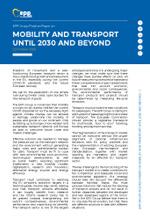
EPP Group Position Paper on Mobility and Transport until 2030 and beyond
1 available translation
EnglishOther related content
6 / 54

